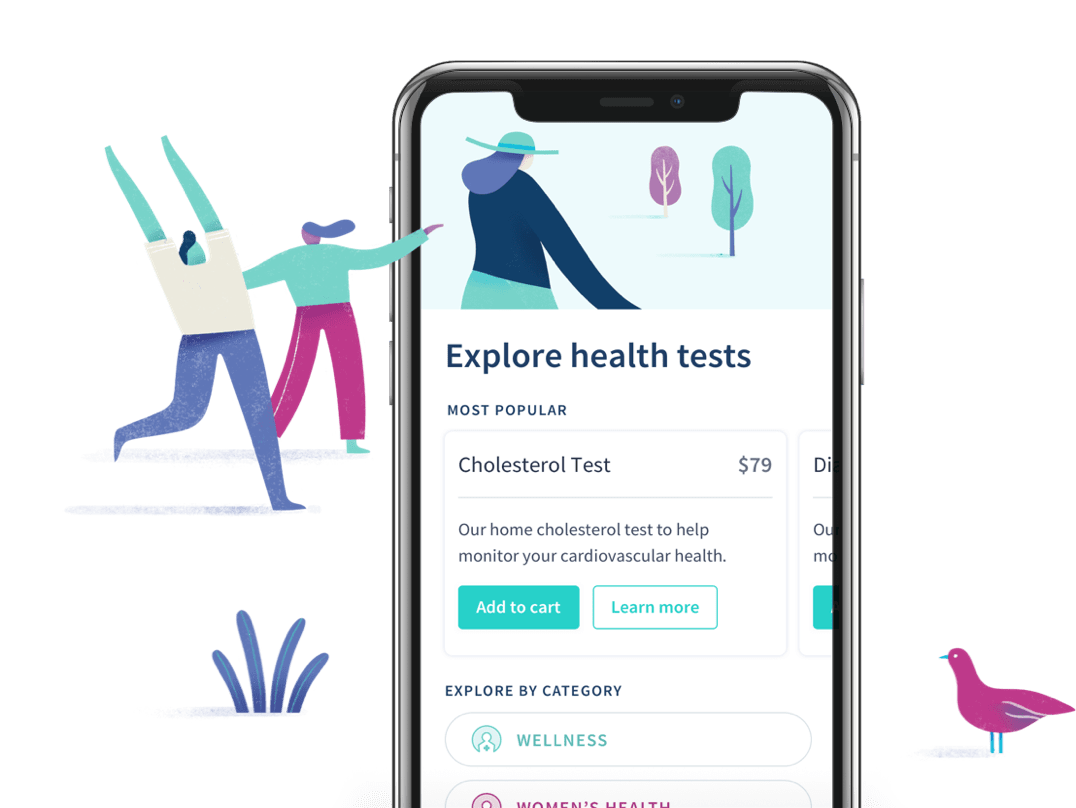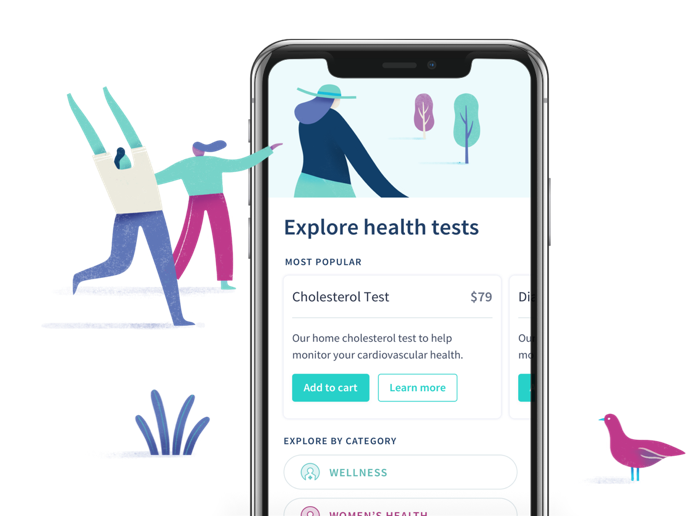PCOS Test
Gain insights into your hormonal health with this test for hormones associated with Polycystic Ovary Syndrome (PCOS) — the most common hormonal disorder among women of reproductive age.
What does it measure?
Testosterone,
Sex Hormone Binding Globulin (SHBG),
Free Androgen Index (FAI),
Follicle-Stimulating Hormone (FSH),
Luteinizing Hormone (LH),
Cortisol and
Anti-Mullerian Hormone (AMH)



Collection Methods
Finger prick, Saliva sample
This test is not permitted for use in NY due to state restrictions. Unavailable to under 20s.
FSA & HSA cards accepted.
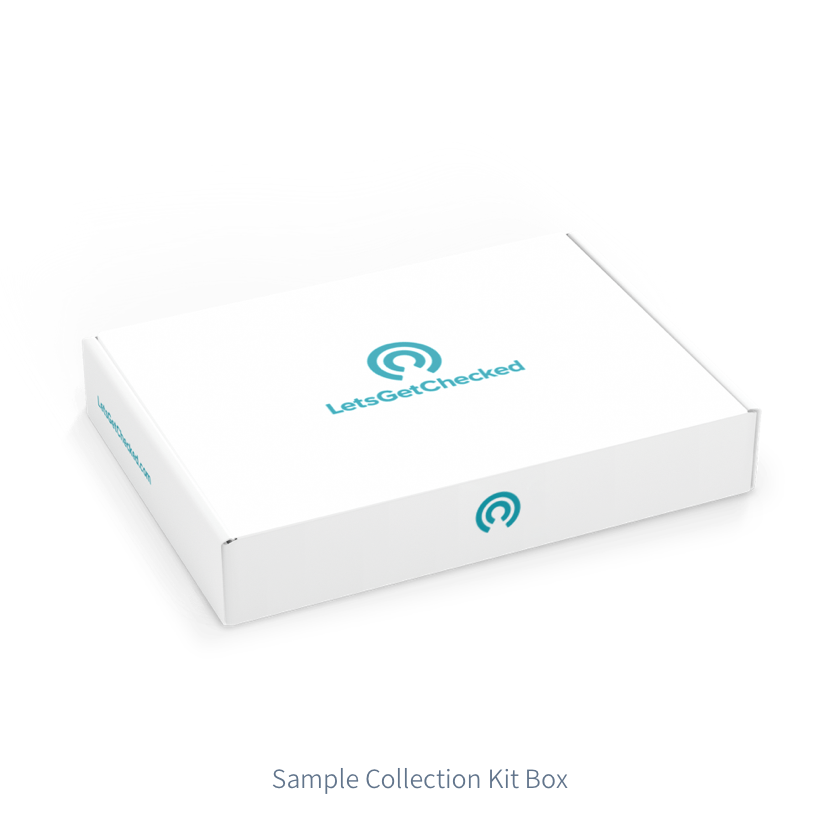
It's estimated that up to 75% of women with PCOS remain undiagnosed when visiting their doctor
Source: Wolf et al., Int J Environ Res Public Health, 2018 Nov; 15(11): 2589
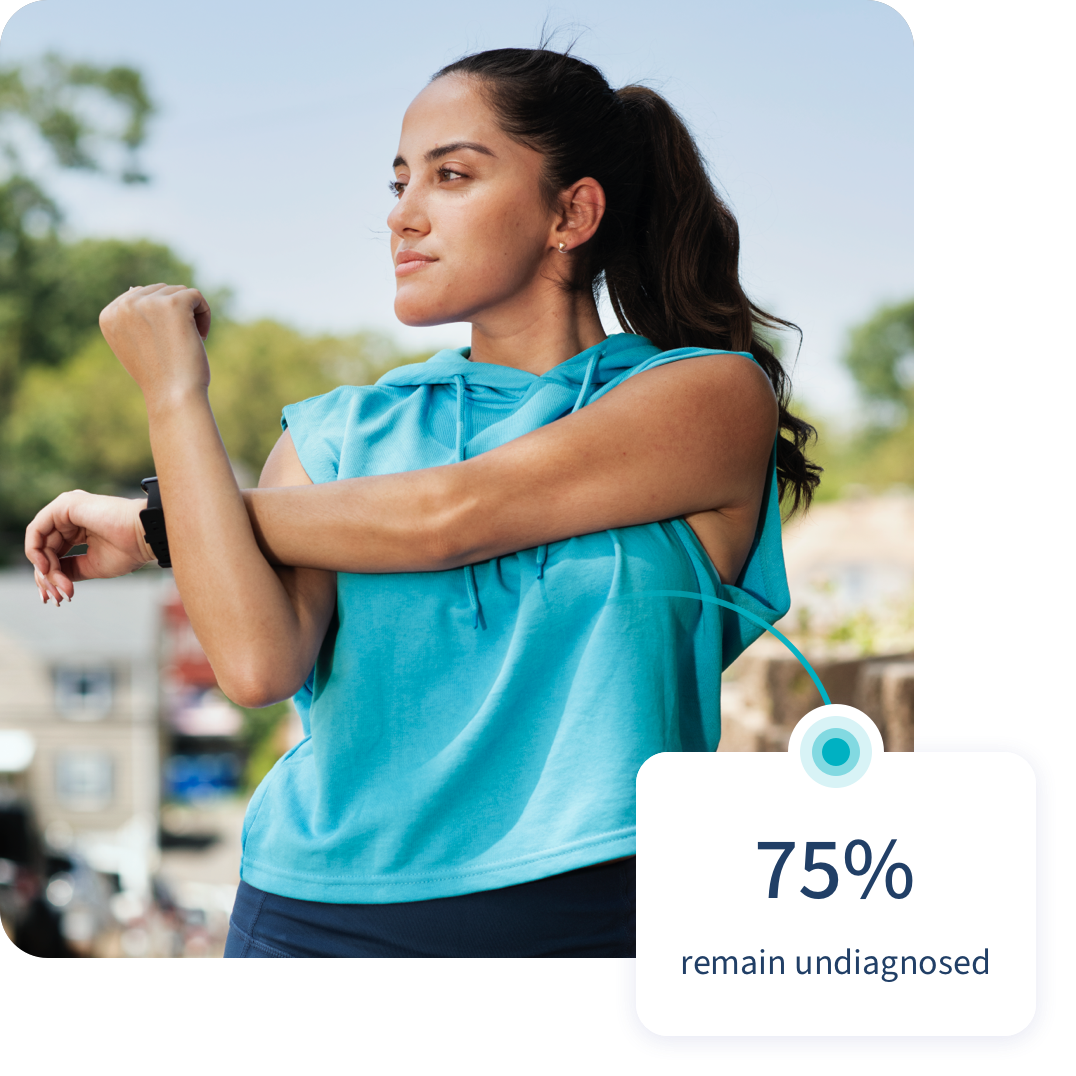
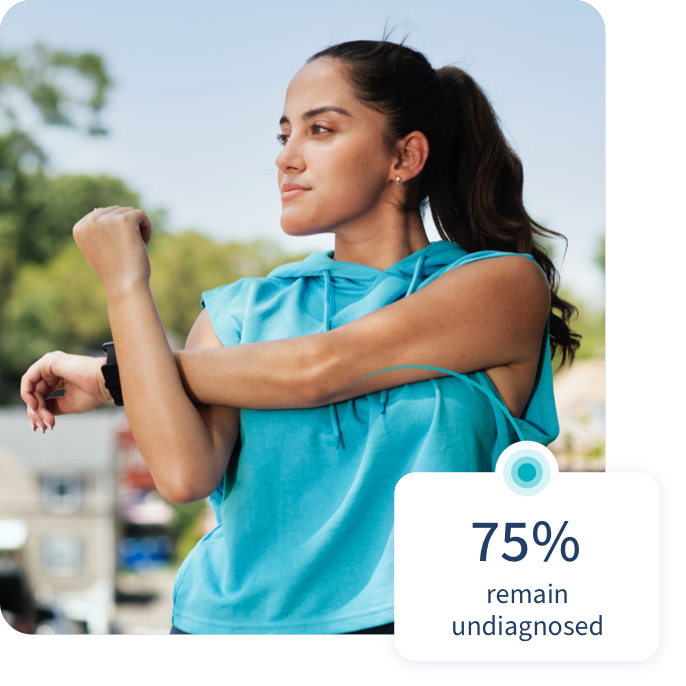
About PCOS
About PCOS
What's measured
This PCOS test measures key hormones, which are chemical messengers in your blood that help control essential functions. These hormones can impact your menstrual cycle and ovulation, as well as your weight and metabolism. Knowing your hormone levels is the first step towards answering questions you might have about certain symptoms that are linked with PCOS. Please remember that additional testing with your provider, such as an ultrasound, will be required after you receive your results, as it is not possible to diagnose PCOS on a blood test alone.
Testosterone
Testosterone is a sex hormone that is produced in your ovaries in small amounts. Raised levels of testosterone can disrupt menstruation and cause symptoms such as acne. Women with PCOS sometimes have increased levels of testosterone, but this result should be viewed alongside other hormone levels covered as part of this test.
Sex Hormone Binding Globulin (SHBG)
SHBG is a type of protein responsible for transporting testosterone and some other hormones through the bloodstream. Your levels can be reduced in PCOS, resulting in an excess of available testosterone in the body.
Free Androgen Index (FAI)
The FAI is not a measure of a certain hormone, but a ratio that compares the total amount of testosterone in your blood to your levels of SHBG. High levels of testosterone can be associated with PCOS.
Follicle-Stimulating Hormone (FSH)
FSH is responsible for the growth and development of ovarian follicles and the release of an egg during ovulation.
Luteinizing Hormone (LH)
LH helps to control your cycle and the production of estrogen and progesterone in your ovaries. LH levels may be raised in PCOS.
Cortisol
Cortisol, often known as the ‘stress hormone’ plays a number of key roles in the body and impacts nearly every organ system. It’s normal for cortisol levels to change throughout the day and night but consistently high or low levels can sometimes be a sign of a problem. Sometimes symptoms of high cortisol and symptoms of PCOS can be similar so it is important to consult with a healthcare provider for further guidance.
Anti-Müllerian Hormone (AMH)
AMH is produced by the follicles in your ovaries. Follicles are small, fluid-filled sacs that secrete a range of hormones, and potentially eggs, into your ovaries. They perform a crucial role in regulating your menstrual cycle and reproductive health. Many things can impact your ovarian reserve (your remaining eggs), including age and hormonal imbalance disorders such as PCOS. People with PCOS may have AMH levels that are higher than normal, which can impact ovulation patterns.
Symptoms
PCOS is a hormonal condition that may affect your overall health, appearance, and fertility. As many as 5 million women in the US have PCOS* and an estimated 50-75% are unaware that they have it**.
Common symptoms of PCOS include:
Irregular periods Excessive hair growth, usually on the face, chest, back, or buttocks Weight gain Thinning hair, and hair loss from the head Acne Irregular periods, often with a lack of ovulation, can sometimes make it difficult to become pregnant. PCOS symptoms can range from mild to severe, and not all women will experience them. Please talk to your healthcare provider about any concerns or symptoms. Remember that additional testing with your provider, such as an ultrasound, will be required after you receive your results, as it is not possible to diagnose PCOS on a blood test alone. *Source: CDC, 2020 **Source: Wolf et al., Int J Environ Res Public Health, 2018 Nov; 15(11): 2589
When to test
You should collect your samples on a Monday-Friday, in the morning before you have breakfast or consume any food or drink (water is permitted)*. Collect and return your samples on the same day.
Remember: Collect your cortisol saliva sample before your hormone blood sample as taking blood samples can sometimes raise cortisol levels. Being unusually stressed, scared, or injured will cause a temporary rise in your cortisol levels. Engaging in vigorous physical activity the day before collecting your sample can lead to an increase in your cortisol levels.
If your period is regular or predictable:
This test should be taken on day 3,4,5,6 or 7 of your menstrual cycle. This is 3-7 days after you start your period.
If your period is absent:
Women with PCOS often have very infrequent or absent periods so planning to take a test on day 3-7 of your cycle may not be possible. If this applies to you, then you can take this test on any day between Monday and Friday. Further interpretation of your results by your healthcare provider may be required based on your individual health profile and symptoms. We will provide your lab report to share with your healthcare provider to make this easier.
If you are taking medication:
There are some common medical conditions or medications, such as hormonal birth control, that might mean this test is not right for you. Read more about these conditions here. This test cannot provide a diagnosis or identify low cortisol levels. Irregular cortisol levels can be caused by many things including the use of certain medications or conditions that impact your adrenal gland. Please consult with a healthcare provider if you are experiencing any symptoms or if you have any underlying conditions. *Always follow the advice of your healthcare provider with regards to fasting, particularly if you have any medical conditions. Please do not drink water for 30 minutes before your saliva sample collection. Collect your saliva sample before you brush your teeth. Testosterone and FAI results will only be provided for women over 20 years of age.
With over 2,000,000 patients the reviews are in
The service this company provides, in my opinion, is better than some doctors I have been to. No exaggeration.
The whole process was easy and I appreciate this option over waiting to do tests with my doctor in regard to female hormones since I am so young. I will be using this option going forward.
Easy to use, and quick to ring me with results and a chat about my concerns. Would recommend to anyone!
No more waiting for weeks on end worrying and stressing. This is the way forward for busy, hardworking people in a modern age.
So so easy! Wish I'd done it sooner just for peace of mind! Was cheaper than going to the doctor for a test.
This was a very discreet and straight forward way to get a test done and to get quick, professional results. They couldn’t have been more helpful.
Fantastic service and call from nurse explaining results was much appreciated. Now I finally have some answers.
Thank you for helping me get a peaceful feeling. I was stressing over this and finally decided to give this a chance. 5 stars, great service!
Really fast results, the nurse who phoned to speak to me was knowledgeable and friendly, and happy to answer any questions. Well worth purchasing if you're considering it!
Comes with very clear instructions and the text reminders are helpful... Would definitely recommend especially if you are having difficulty getting a testing appointment or are nervous.
I loved that they kept me up to date with where my samples were — it was extremely reassuring and put my anxiety at ease. I then got a HUMAN phone call to tell me my results which was wonderful.
Very efficient. Would definitely recommend it for anyone looking for reassurance.
How it works
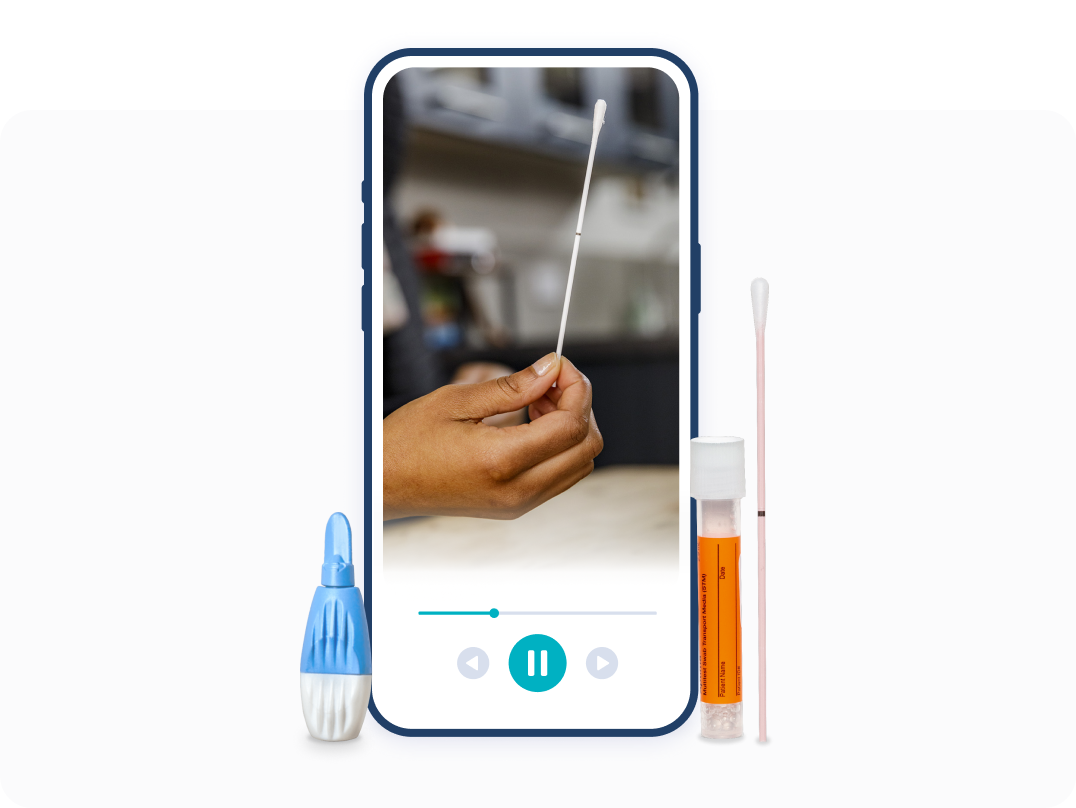
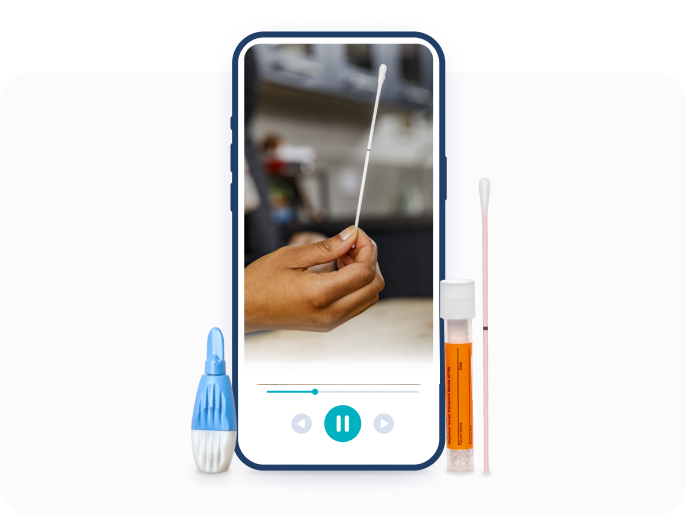
Easy sample collection
Collect your sample from the privacy of home and return using the prepaid shipping label
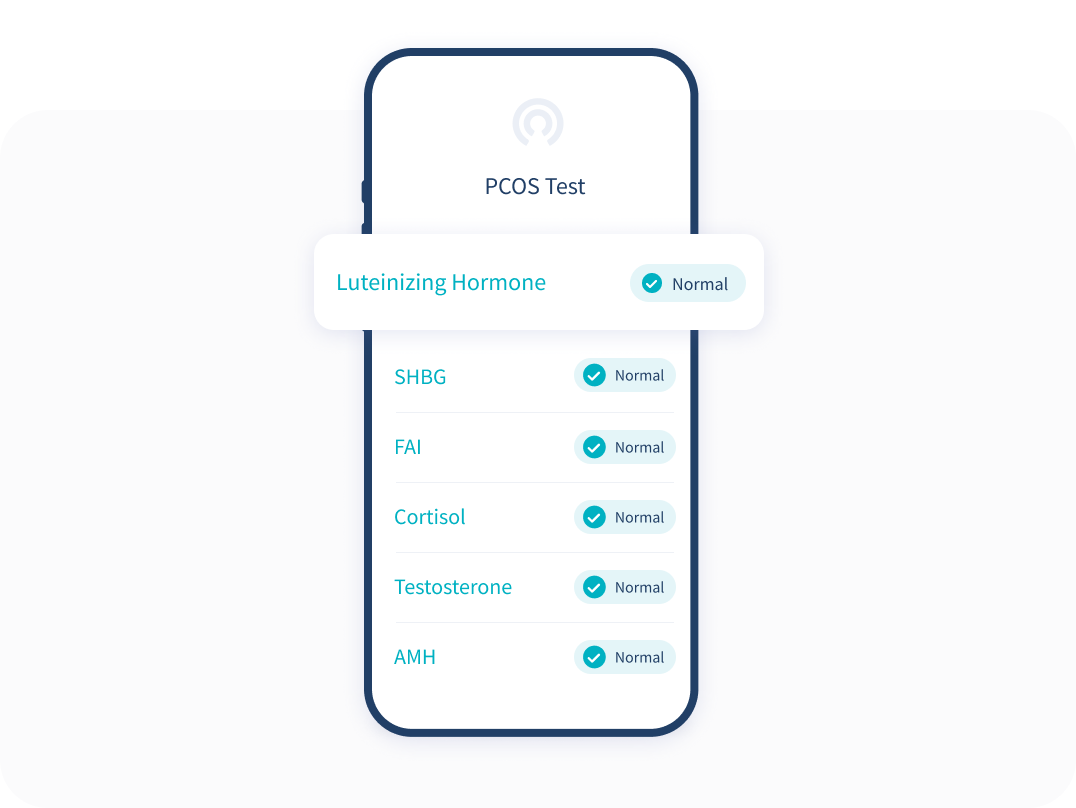
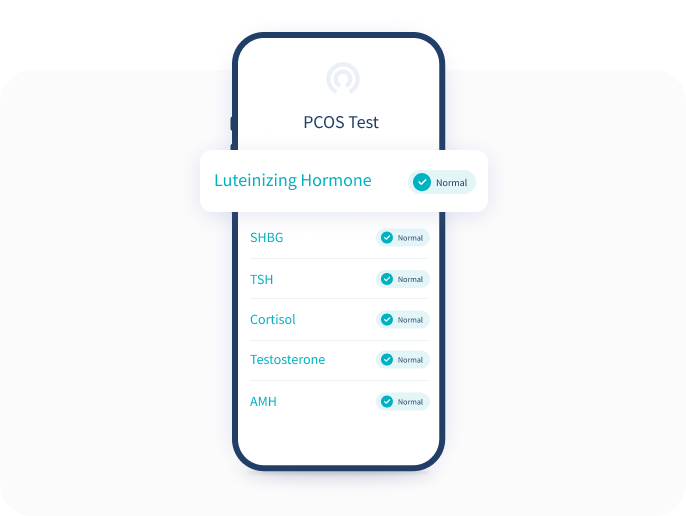
Review results
Your easy-to-understand results will be available through your online dashboard in 2-5 days


Get medical support
Additional 1-1 support from our clinical team may be provided to discuss your results
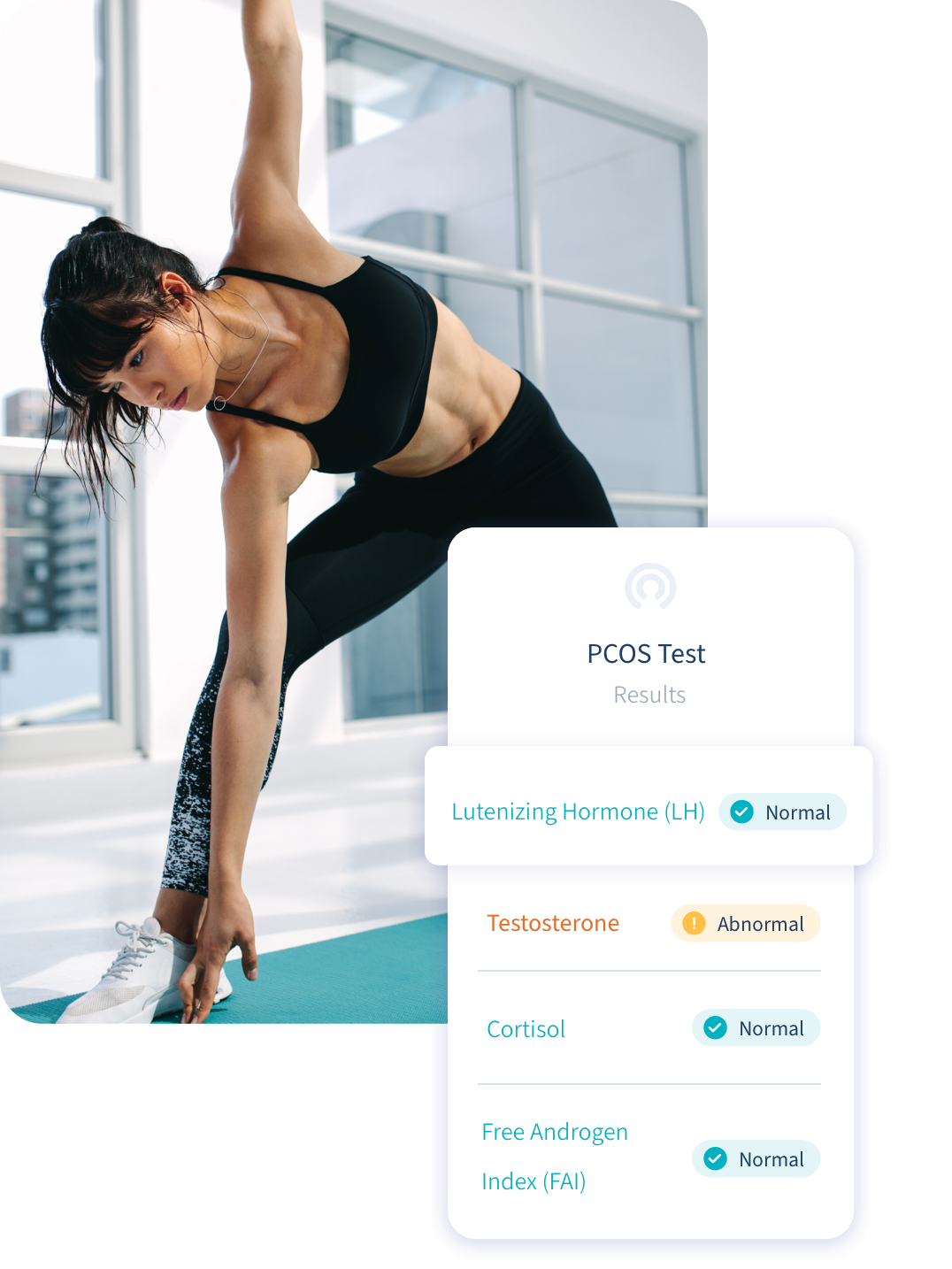
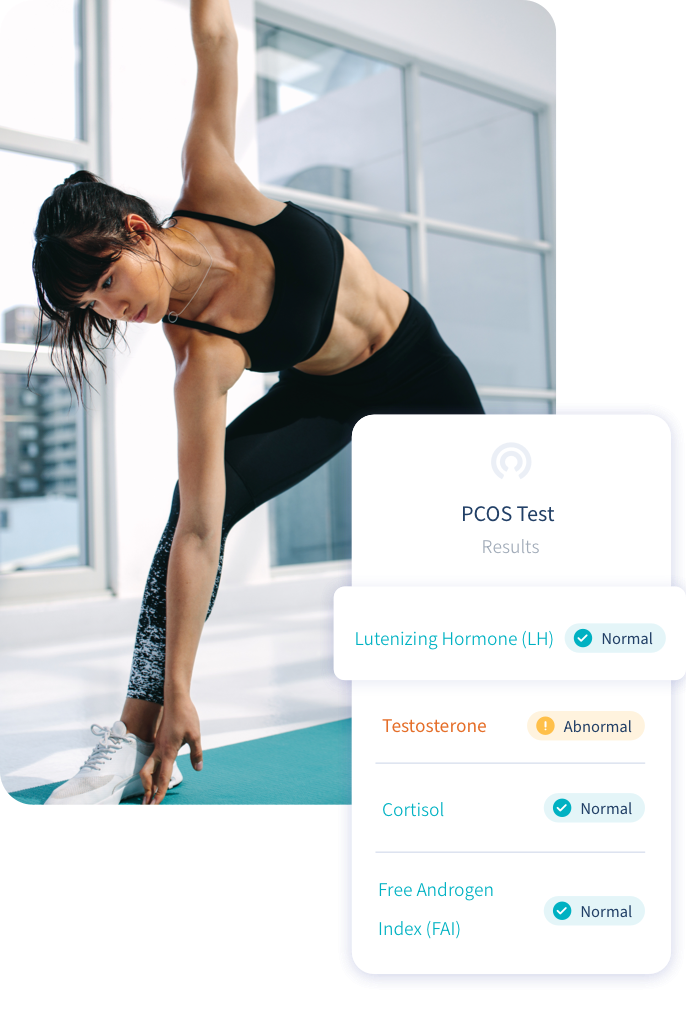
Reaching the right diagnosis
Individual experiences of PCOS vary greatly from person to person, which means it can often be difficult and time-consuming to diagnose. The vital hormonal insights provided by this test can help you and your healthcare provider reach the answers you need by making your conversations easier and more informed.
No hormone test on its own can provide a diagnosis of PCOS, so further follow-up with a healthcare provider will be required after receiving your results. Follow-up may include further tests and/or an ultrasound.
Feel empowered with insights you can rely on
We understand that searching for answers about your health can be frustrating. Our mission is to make it easier. If you're living with symptoms like irregular periods, acne, or weight gain, the power to take control of your hormonal health is just one test away.


A medical team you can trust
Meet your dedicated, at-home medical team. Get unlimited access to our clinical experts who can help guide you on your hormonal health journey.

Kristin O'Connor
Nurse Manager

Tiffany Liles
Nurse Practitioner

Amal Hamdan
Lead Nurse
Still have questions?
Here are some questions we usually get about LetsGetChecked. If you would like yours answered, please contact us ›
This test will not be suitable for everyone, including if:
You are under 20 years of age.
You do not have ovaries.
You are on hormonal contraception, hormone replacement therapy, steroid or testosterone-containing medications including gels, creams, patches, and oral medication.
You are at an increased risk of fainting/ loss of consciousness due to blood sample collection, including if you have an arrhythmia, history of vasovagal syncope (fainting), or fear of blood.
You have a bleeding disorder or are taking medication that increases the risk of bleeding including (but not limited to) untreated hemophilia or use of blood-thinning medications.
You have impaired lymphatic circulation in both upper limbs.
You have a skin disorder or condition that may result in poor healing, an increased risk of disease or skin ulceration — including (but not limited to) Raynaud's, Scleroderma, peripheral vascular disease or peripheral neuropathy.
It may be more difficult to collect a sample if you have hard or callused skin on your fingertips.
Please see our FAQ on medications and supplements that could interfere with your test results for more information.
For your safety, you should not take this test if you are on medications such as blood thinners that increase your risk of bleeding. This test is not suitable if you are on hormonal contraception, hormonal replacement therapy, steroids or testosterone-containing medication (taken by mouth or topically in gels, creams, or patches), or if you have taken any of these medications in the 3 months prior to sample collection as your results may be impacted. Hormonal contraception lowers testosterone, FSH, LH, and AMHlevels and raises SHBG levels, therefore, the results would have limited use in the assessment of PCOS. Please speak to your healthcare provider about your symptoms and the best testing options for PCOS while on hormonal contraception. Biotin supplements may impact your test results if taken less than 8 hours before sample collection. Biotin is commonly found in multivitamin or B complex supplements. Please discuss any changes to your medication with your healthcare provider before taking this test.
No, this test alone cannot diagnose PCOS. There are several elements healthcare providers consider when diagnosing PCOS including test results, symptoms, and potentially ultrasounds scans and further tests. This test is a great first step towards diagnosis. If your results are abnormal, our clinical team can explain your results to you, answer your questions and guide you to your next steps. Taking this test can empower you to have an informed conversation with your healthcare provider to better enable their diagnosis. We provide a downloadable lab report for you to share with your healthcare provider.
If your period is absent or very infrequent we understand that you cannot plan to take this test on days 3-7 of your cycle. Instead, you can collect your samples on any Monday-Friday following the rest of the instructions provided. Your results may require further interpretation by a healthcare provider based on your individual health profile and symptoms. We provide a downloadable lab report for you to share with your healthcare provider.
You should collect your samples Monday-Friday, in the morning while fasting, and ensure your return is scheduled for the same day.
This test should be taken on days 3 to 7 of your menstrual cycle. This is 3-7 days after you start your period. If your period is absent or very infrequent and you cannot plan to take this test on days 3-7, please collect your samples on any Monday-Friday following the instructions. In this case, further interpretation of your results may be required and we provide your lab report in order to do so.
Fasting means that you take the test in the morning before you have breakfast. You can still drink water when fasting but avoid drinking water in the 30 minutes prior to collecting your saliva sample. Always follow the advice of your physician with regards to fasting, particularly if you have any medical conditions.
Collect your saliva sample before your blood sample. It is important to take your samples in this order because, for some people, taking a blood sample can temporarily raise their cortisol levels. For cortisol results that most accurately reflect your average levels, you should take your test at a time when you feel safe and calm and were not unusually stressed, scared, injured, or engaged in vigorous exercise in the 24 hours beforehand.
Collect your saliva sample before you brush your teeth. You should have fasted for 12 hours when taking your samples but do not eat, drink, or take any medication by mouth for 30 minutes prior to sample collection. Certain supplements such as biotin may impact your test result if taken less than 8 hours before sample collection. Speak to your healthcare provider before making changes to your medication schedule.
Please do not collect or return samples on a Saturday or Sunday.
It is very important to diagnose PCOS as early as possible because not only can it impact your fertility, but it also increases your risk of heart disease, type 2 diabetes, and sleep apnea. Lifestyle changes and management of PCOS can help reduce these risks, improve fertility and manage or reduce symptoms.
At this time we cannot provide testosterone, SHBG or FAI results for women under 20. As these are important biomarkers for your healthcare provider to establish or rule out a PCOS diagnosis this test is not suitable for those under 20.
This test is only suitable for people with ovaries. If you identify as a man or gender non-specific and have ovaries, and you are not on hormonal therapy, then you can take this test.
If your results are abnormal, our nurses will call to explain your results, answer your questions and guide you through your next steps. Your next steps are sharing your lab report with your healthcare provider and discussing any symptoms you have with them. Your healthcare provider may follow up with further tests or scans before a diagnosis can be reached.
PCOS is very common. The CDC estimates that 6-12% (or as many as 5 million) of US women have PCOS*. However, as many as 50-75% of women with PCOS may be unaware of their condition**.
*Source: CDC, 2020 **Source: Wolf et al., Int J Environ Res Public Health, 2018 Nov; 15(11): 2589
Activating the PCOS test connects you to the unique alphanumeric barcode within your LetsGetChecked sample collection kit. The laboratory cannot process your sample if the test is not activated and linked to you.
LetsGetChecked works with a team of clinicians who will review your order and results.
Our clinical team is on standby throughout the testing process and, if your test results are abnormal, you may receive a call to discuss your results and next steps.
Keeping your personal data secure is important to us. We use appropriate technical and organizational measures to ensure the security and confidentiality of your information, and only share your information where required to deliver our products and services or where we have a legal basis to do so. All samples are disposed of following analysis.
LetsGetChecked tests are physician-approved and are as accurate as tests you would take in a healthcare facility. All tests are analyzed in labs which are CLIA certified and CAP-accredited in the US.
All of these laboratories undergo a frequent quality control check to ensure the highest standard of testing. The equipment and analyzers used in our partner labs are all designed for the specific function of capillary testing. All kits come with clear instructions that will guide you on how to take your sample.


